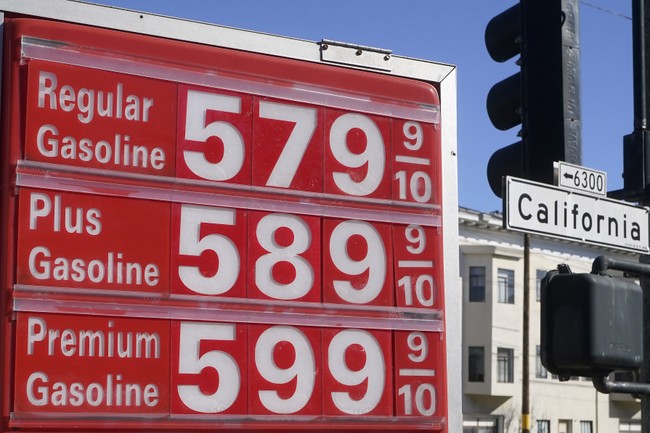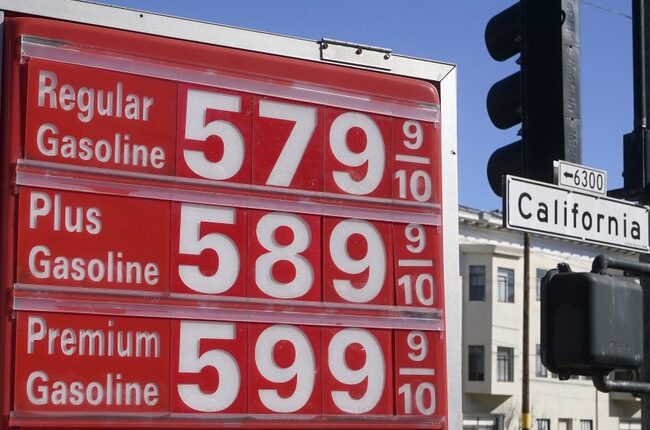
By Mike Garcia
AAA reports that California drivers are paying an average of $4.66 a gallon this week— more than $1.50 above the national average. The main reason? State policy. California’s gasoline excise tax alone accounts for much of that difference, making fuel far more expensive west of the Colorado River.
As of July 1, 2025, Sacramento levies 61.2 cents per gallon in state excise tax—an automatic, inflation-indexed charge that rose again this summer and will continue to climb every July unless lawmakers intervene. Put simply, before a gas station earns a single cent, the state takes more than sixty.
This is not normal.
Next door in Arizona, the state excise tax is 18 cents per gallon. This 43-cent gap explains why families often top off in Lake Havasu or Yuma before crossing into California. All drivers pay the federal tax of 18.4 cents per gallon, but California’s steep premium is homegrown.
The real issue isn’t just how high the tax is – it’s how it’s designed to keep rising automatically. Under current law, the excise rate adjusts each July based on inflation. That’s why it rose from 59.6 cents to 61.2 cents this year. The term “Indexation” may sound technical, but the result is simple: Without a deliberate vote from the legislature, Californians pay more every year. For a nurse or delivery worker commuting from the Antelope Valley to downtown Los Angeles, those pennies add up fast.
Economists have long warned that per-gallon taxes on essentials are regressive, hitting working families hardest. Recent academic work confirms that gasoline taxes burden lower-income drivers most — long commutes, with high housing costs forcing people to drive further to work just to afford a home. The further you drive, the harder the taxes bite.
Supporters of the current system claim that high taxes are the price of good roads. But even Sacramento’s own budget analysts have noted the imbalance: According to the Legislative Analyst’s Office, every one-cent cut in the gasoline excise tax reduces state revenue by just 0.05% of total state spending — a tiny fraction of the budget.
And what do Californians get for that money? Not much. The Reason Foundation’s latest report ranks states on 13 measurable categories — from pavement and bridges to congestion and efficiency. The results are telling: North Carolina charges about 40.3 cents per gallon and ranks first in overall highway performance; Tennessee charges about 27.4 cents and ranks fifth — both far ahead of California, which charges 61.2 cents and ranks 49th.
Clearly, how funds are spent matters more than how much is collected.
SEE ALSO: Trump Proving to Be the King of Lowering Gas Prices, As White House Celebrates Latest National Average
Explosion at Major CA Refinery Will Likely Lead to Surge in Gas Prices in CA – and 2 Other States
An America-First energy policy should measure success by its impact on daily life — getting to work, school, church, Little League practice, or simply visiting family. By that standard, California’s excise policy fails. Automatic annual hikes make driving a luxury for many families, forcing them to travel less, skip trips, or cross the border to save a few dollars — while potholes still riddle Barstow and Bakersfield.
There is a better way forward. First, lawmakers should stop automatic yearly increases and require a “yes” vote for any future hikes. Indexation allows Sacramento to avoid hard budget choices and quietly collect more money without accountability. Second, lawmakers should compare California’s rates to neighboring states. When Arizona sits at 18 cents and California is at 61.2, it’s obvious that taxpayers are getting fleeced.
Californians deserve real votes that lower gas taxes — so working families can keep more of every paycheck, and mobility does not become a luxury.
None of this denies that roads require funding. But California already charges a 2.25 percent sales tax on gasoline in addition to the nation’s highest excise taxes. The issue is not whether we fund infrastructure – it’s how we do it. If more revenue is truly needed, lawmakers should make their case transparently, specify the purpose, and earn the public’s support.
If Sacramento truly wants to help working families, it should stop taxing their commutes. Californians shouldn’t have to worry about affording a full tank. The Legislature should pause the automatic hikes and lower the rate – because a state that claims to champion working people should prove it at the pump.
Mike Garcia serves as Chairman of the America First Policy Institute’s California chapter. He previously served in Congress, representing California’s 27th district in northern Los Angeles County.
Editor’s Note: The Schumer Shutdown is here. Rather than put the American people first, Chuck Schumer and the radical Democrats forced a government shutdown for healthcare for illegals. They own this.
Help us continue to report the truth about the Schumer Shutdown. Use promo code POTUS47 to get 74% off your VIP membership.









